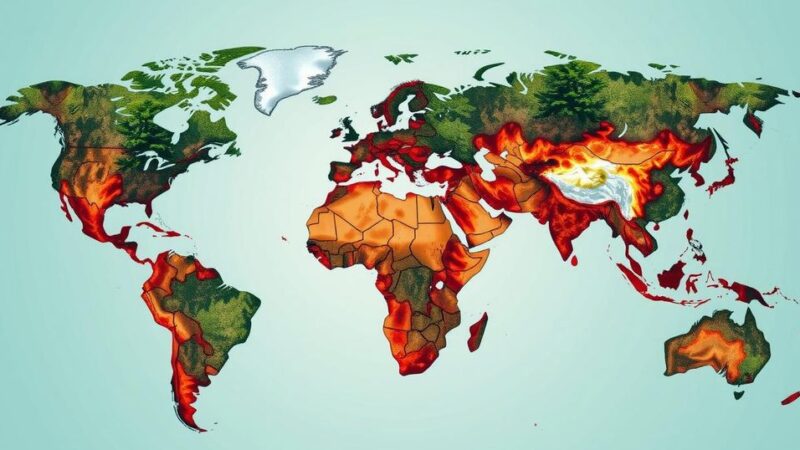In 2024, Earth recorded its hottest year ever, surpassing the 1.5 degrees Celsius threshold established by the Paris Agreement. This unprecedented temperature rise signals severe implications for global health, biodiversity, and environmental stability, following an unprecedented year of climate-related disasters. Experts attribute this trend predominantly to greenhouse gas emissions from fossil fuels, urging immediate and coordinated global action to address climate change effectively.
In 2024, Earth experienced unprecedented warming, claiming the title of the hottest year on record, as reported by various meteorological organizations on Friday. Notably, this year marked the first occasion in which global temperatures sustained levels beyond a critical threshold, set at 1.5 degrees Celsius (2.7 degrees Fahrenheit), since global measurements commenced in the late 1800s. If temperatures persist above this threshold, scientists warn of dire consequences, including increased mortality rates, significant environmental destruction, loss of biodiversity, and rising sea levels linked to extreme weather phenomena. The year concluded with 27 disastrous climate events in the United States that each incurred damages exceeding one billion dollars, showcasing the immediate repercussions of this alarming trend in global temperatures.
The 2024 global temperature surpassed 2023’s previous record, exceeding the long-term warming limit outlined by the Paris Climate Agreement. Measurements from various agencies indicated that global temperatures reached between 1.46 degrees Celsius to 1.62 degrees Celsius above pre-industrial levels, with the European Commission’s Copernicus Climate Service reporting the highest figure at 1.62 degrees Celsius. This disparity among temperature assessments stems from differing ocean temperature measurement techniques employed by these organizations.
Experts attribute this significant warming to the accumulation of greenhouse gases in the atmosphere due to the continuous combustion of fossil fuels. Samantha Burgess, a strategic climate lead at Copernicus, remarked, “The primary reason for these record temperatures is the accumulation of greenhouse gases in the atmosphere.” Each subsequent increase in atmospheric temperatures exacerbates associated climatic effects, including heightened sea levels and more extreme weather phenomena.
Long-term forecasts suggest that the year 2025 may not witness temperatures surpassing those of 2024, primarily attributed to the anticipated cooling effects of La Niña, although it may still rank among the warmest years observed. Recent data indicate an alarming upward trend in ocean heat content, prompting scientists to highlight concerns regarding the potential acceleration of climate change impacts. University of Pennsylvania climate scientist Michael Mann expressed, “We are now reaping what we have sown.”
Nonetheless, many experts stress the importance of recognizing the 1.5-degree target as pivotal for future climate policy. This threshold is not simply numerical but serves as an alarm signifying humanity’s precarious situation in combating climate change. Northern Illinois University’s Victor Gensini asserted that exceeding it, even for a single year, is indicative of humanity’s perilously close approach to breaching limits established by international agreements, which could result in extensive ecological and humanitarian crises.
The increasing trend in global temperatures highlights the urgency of addressing climate change effectively. Scientific consensus underscores the correlation between greenhouse gas emissions from fossil fuels and rising global temperatures. The 2015 Paris Agreement established 1.5 degrees Celsius as a critical threshold indispensable for minimizing detrimental environmental impacts. Persistent breaches of this limit reveal the escalating consequences of climate change, including extreme weather events, biodiversity loss, and significant socio-economic challenges. The alarming data from recent years necessitates an immediate reassessment of global environmental policies and strategies in order to stabilize atmospheric temperatures.
The record-breaking temperatures of 2024 serve as a profound indicator of humanity’s ongoing climate crisis, revealing an urgent need for comprehensive action to mitigate greenhouse gas emissions. The surpassing of the 1.5-degree Celsius threshold signifies not only a critical environmental alarm but also calls for international cooperation in climate action. Without prompt and sustained efforts, humanity faces escalating consequences, including further climate-induced disasters, loss of biodiversity, and severe socio-economic impacts. Stakeholders across all sectors must prioritize sustainable practices, ensuring a viable planet for future generations.
Original Source: www.keranews.org







